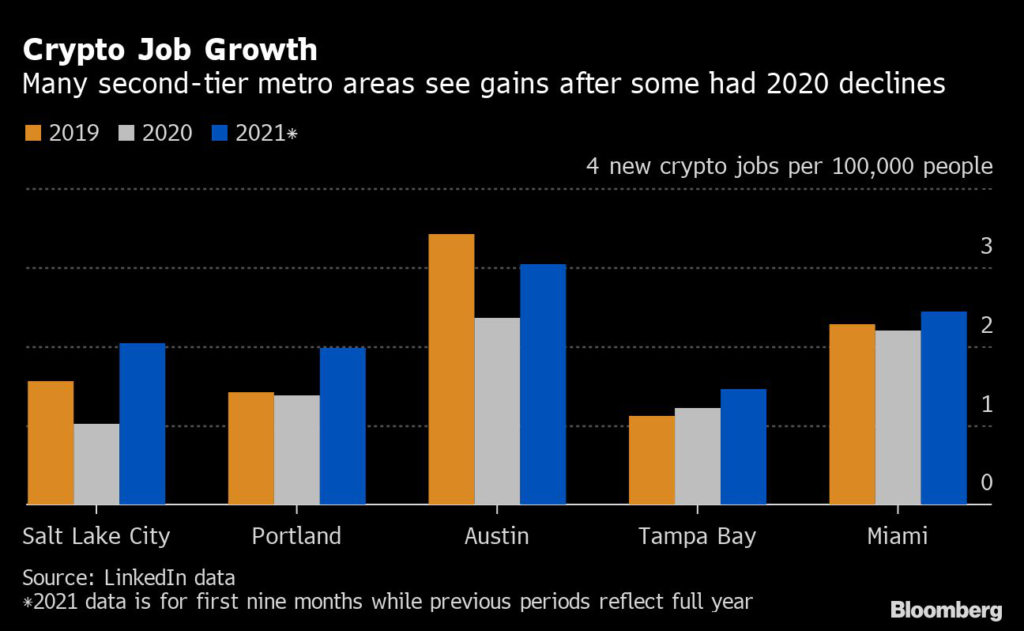(Bloomberg) —
The crypto job market in the U.S. is mirroring the decentralized ethos of the industry itself — it’s everywhere.
New York, San Francisco and Los Angeles have the largest shares of crypto hires this year, followed by the Miami and Chicago metropolitan areas, according to a new ranking based on LinkedIn data. But the remaining 53% of crypto jobs in the study were dispersed elsewhere in relatively small chunks, the data show.
The study, provided by LinkedIn at Bloomberg’s request, shows that the industry hasn’t settled on a single hub like finance in New York, tech in San Francisco and movies in Hollywood. It’s the result of a culture where many crypto entrepreneurs will often hold themselves out as renegades who reject traditional boundaries. At the same time, the global pandemic has shown white-collar work can be done from anywhere.
“Crypto companies are an extreme version of tech, where the ethos of their work is about being decentralized,” said Seattle-based Diogo Monica, co-founder of crypto technology services company Anchorage Digital, which is hiring for remote jobs around the world. “This means cities and states with lower taxes, great infrastructure, and quick access to an international airport will benefit from fully remote work.”
A crypto hire is any LinkedIn member who started a new job with titles including the keywords “crypto,” “blockchain,” “Bitcoin,” “Ethereum,” or “Solidity” — the latter being a smart contract programming language used for blockchain technology. The data is meant to serve as a rough proxy for the broader crypto job market, but by design, it will only capture crypto specialists, and not, for instance, a human resources worker for a crypto company. The study covers the first nine months of the year.
Adjusting for population, crypto is having a clear impact on mid-sized metropolitan areas. The amount of total jobs pale in comparison to larger cities, but per capita the job creation is sizable. Two or more people were hired for crypto jobs this year for every 100,000 LinkedIn members in Austin, Texas; Denver; Raleigh, North Carolina; and Salt Lake City.
Hubs such as New York and San Francisco still control a significant share of the jobs, as they have with other areas of financial technology. But crypto celebrities and thought leaders have shown they have the sway to lure newcomers to nontraditional markets.
Elon Musk, who has whiplashed coins with his crypto musings on Twitter, is moving Tesla Inc. to Austin. Cathie Wood, the famous Bitcoin bull and ETF manager, is moving Ark Investment Management to St. Petersburg, Florida. And crypto booster and investor Anthony Pompliano has put down roots in Miami.
Miami Mayor Francis Suarez — who openly daydreams of making the Magic City the “crypto capital of the world” — said different parts of the U.S. will naturally have different competitive advantages. He said crypto mining has the potential to revitalize parts of rural America wherever surplus electricity can be found cheap. Meanwhile, exchanges and the popular crypto convention circuit are flocking to urban centers nationwide.
“The medium to long-term prospects are enormous,” Suarez said. “It’s as transformational as the Industrial Revolution was.”
Certainly, there’s more than a little risk in betting a city’s economic future on crypto or blockchain. The emerging technology still faces an uncertain path fraught with regulatory hurdles. But the potential payoff is proving to be compelling as the number of jobs in crypto is clearly accelerating in most places. Many cities are on pace to surpass crypto hiring from previous years, especially in second-tier markets.
Robert Zagotta, U.S. chief executive officer of cryptocurrency exchange Bitstamp, said his company is happy to be in New York, but also praised darkhorse crypto towns like Miami, where Suarez has proposed paying city employees a portion of their paychecks in Bitcoin and allowing residents to pay taxes and fees in the cryptocurrency.
“Forward-thinking cities like that will continue to see rich growth in job creation in this flourishing industry,” he said.
LinkedIn has approximately as many members in the U.S. as there are workers in the U.S. labor force, making it a useful — if imperfect — dataset in the absence of official Bureau of Labor Statistics data on the sector. The team analyzed over 5,000 hires since January 2019 whose jobs met the criteria, and the most common job titles among them were cryptocurrency trader, blockchain developer, Bitcoin miner, blockchain specialist and blockchain consultant.
(Updates to add detail to final chart and location of source in fourth paragraph)
More stories like this are available on bloomberg.com
©2021 Bloomberg L.P.











